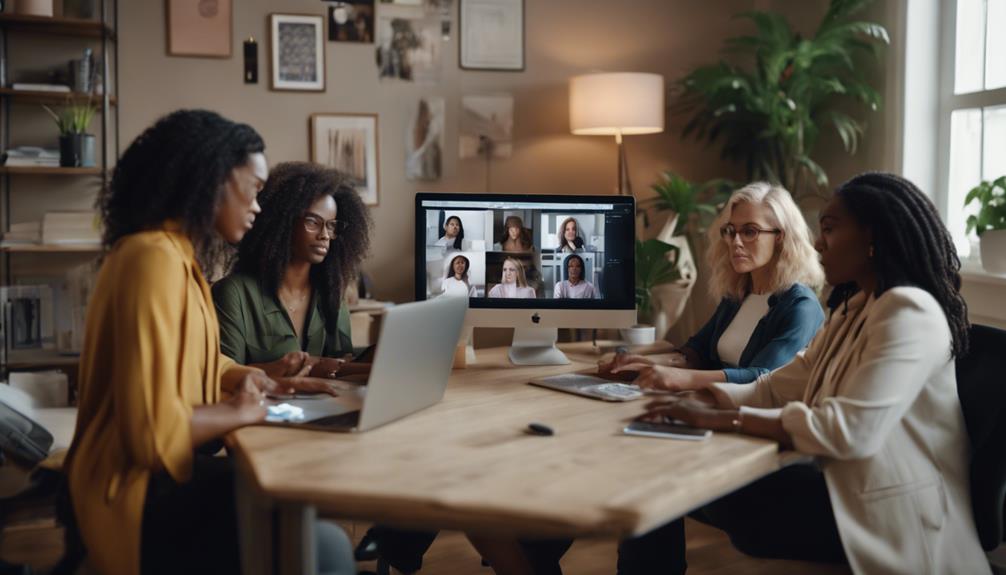Women in public speaking and leadership often confront unique challenges, but you can overcome them with the right strategies. Focus on building self-awareness to understand your communication strengths and weaknesses. Embrace authenticity over perfection; audiences respond better to genuine speakers. Combat interruptions in meetings with intentional strategies that foster inclusivity and respect. Develop your self-promotion skills by sharing your achievements confidently. Additionally, practice delivering difficult messages with clarity and empathy. By actively engaging in supportive networks, you'll enhance your leadership presence. Explore further strategies to empower yourself in this journey and open your leadership potential.
Key Takeaways
- Cultivating self-awareness enhances women's communication skills, enabling them to identify strengths and areas for improvement in public speaking.
- Emphasizing authenticity over perfectionism fosters genuine connections with audiences, increasing engagement and influence.
- Implementing "no-interruption" rules in discussions promotes inclusivity and ensures women's contributions are recognized and valued.
- Building confidence through mentorship and supportive networks encourages women to effectively self-promote their achievements.
Communication Skills and Self-Awareness
Understanding your strengths and weaknesses can make a world of difference in how effectively you communicate in public speaking and leadership roles. Self-awareness is key; it helps you identify areas for improvement and leverage your strengths, ultimately enhancing your communication skills.
As the motivational speaker industry continues to evolve, the demand for authentic and engaging speakers is on the rise, highlighting the importance of impactful messages that resonate with audiences. When you're aware of your unique qualities, you can deliver messages more authentically, fostering a genuine connection with your audience.
Reflective practices, like journaling or seeking feedback, play an essential role in developing your emotional intelligence. This adaptability is important for steering through diverse speaking environments.
Many women feel their communication skills fall short, often attributing this to personal limitations. However, targeted coaching can bridge this gap and empower you to overcome those barriers.
Mentorship programs are invaluable in this process. They provide tailored guidance, helping you build the confidence to speak and listen actively. By engaging with mentors, you can refine your leadership development journey, enhancing your self-awareness along the way.
Increased self-awareness leads to more genuine communication, allowing you to assert your leadership presence and connect deeply with your audience.
Perfectionism Vs. Authenticity

Perfectionism can stifle your voice, while authenticity empowers you to connect genuinely with your audience. As a woman in public speaking and leadership, you might feel the pressure to present yourself flawlessly, but aiming for perfection often leads to anxiety and over-preparation. This detracts from the authentic communication that builds trust and rapport with your listeners.
Research shows that audiences respond more positively to those who are genuine rather than those who chase an unattainable ideal. Embracing authenticity allows you to share your unique perspective, fostering a culture of openness and vulnerability within your team.
Workshops focused on public speaking encourage women to prioritize authenticity over flawless delivery, creating supportive environments for practice. Balancing professionalism with personal expression is essential; authentic leaders engage their audiences effectively, leading to greater influence in their fields.
Interruptions in Meetings

Interruptions during meetings often undermine women's contributions, making it harder for their ideas to gain the recognition they deserve. Women frequently report experiencing interruptions, which can lead to feelings of inadequacy and marginalization. This dynamic not only affects effective communication but also hinders their leadership role within the team. Research shows that women are perceived as less authoritative, increasing their chances of being interrupted compared to men.
To combat this issue, creating an equitable discussion environment is vital. Implementing strategies such as a "no-interruption" rule can help guarantee that everyone's voice is heard.
Tools like a "talking stick" can also facilitate smoother communication, allowing for more structured dialogue. Active listening plays an essential role in fostering respect and inclusivity, encouraging all participants to engage thoughtfully with one another.
Self-Promotion Challenges

When it comes to self-promotion, you might find self-doubt creeping in, making it tough to showcase your achievements.
Historically, female speakers like Michelle Obama have demonstrated the power of storytelling and audience connection, which can serve as inspiration.
Effective communication techniques can help you articulate your value without feeling boastful.
Overcoming Self-Doubt
Overcoming self-doubt in self-promotion is vital for women to confidently showcase their achievements without fear of being perceived as boastful. Many women hesitate to self-promote due to societal expectations that favor modesty, which can lead to their accomplishments going unrecognized.
You might feel judged more harshly than your male counterparts, making it even harder to speak up about your successes. Creating a supportive environment is important. Surround yourself with mentors who encourage you to celebrate your achievements and help you refine your skills.
They can guide you through assertive communication techniques that empower you to articulate your value without feeling guilty. One effective approach is the "Compliment and Build" technique, where you acknowledge others' contributions before highlighting your own.
This method not only eases the tension of self-promotion but also fosters collaboration.
Effective Communication Techniques
Mastering effective communication techniques can greatly enhance your ability to self-promote and assert your contributions in any professional setting. To overcome self-promotion challenges, consider implementing strategies that build your leadership presence and confidence.
Utilize techniques such as "Compliment and Build" to acknowledge others' ideas while inserting your own. This practice makes your contributions more visible without feeling boastful. Active listening is another vital skill; it not only helps you understand others better but also allows you to steer conversations toward your achievements.
Building a supportive network through mentorship is equally essential. Engaging with mentors can provide guidance and reinforce your confidence in self-promotion. Below is a table summarizing techniques to enhance your communication skills:
| Technique | Purpose | Example |
|---|---|---|
| Compliment and Build | Assert your ideas while acknowledging others | "I love your point; adding my perspective…" |
| Active Listening | Redirect conversations effectively | "That's interesting; I think my experience aligns…" |
| Networking | Build connections for support | Attend industry events |
| Seeking Mentorship | Gain insights and confidence | Ask a leader for advice |
| Assertive Communication | Clearly express your contributions | "I led the project that achieved…" |
Building Confidence Strategies
Building confidence in self-promotion is fundamental for women to effectively assert their value and seize opportunities in the workplace. Many women hesitate to promote themselves due to societal expectations, which can hinder their visibility and career advancement.
To combat this, consider employing specific strategies that enhance your confidence in public speaking and self-promotion. One effective technique is the "Compliment and Build" approach. Acknowledge others' contributions before sharing your ideas. This not only demonstrates active listening but also allows you to insert your thoughts seamlessly. Timing is essential; find moments in conversations where you can contribute meaningfully without seeming intrusive.
Additionally, engage in practice sessions to refine your communication skills. Seek constructive feedback from trusted colleagues or mentors, as this can greatly boost your confidence.
Delivering Difficult Messages

Delivering difficult messages can be intimidating, but with the right preparation and empathy, you can foster understanding and maintain trust with your audience. High anxiety levels often accompany such moments, making clarity in your messaging essential for effective public speaking. You'll want to anticipate audience reactions, allowing you to frame your message in a way that addresses concerns proactively.
Empathy is vital when you need to deliver difficult messages. By understanding your audience's perspective, you create an environment of openness and trust. This connection can lead to more productive conversations. Preparation and practice are your allies here; they greatly reduce the fear of confrontation, empowering you to speak with confidence and composure.
Incorporating storytelling techniques can also enhance your message. Sharing relatable stories helps bridge emotional gaps, making it easier for your audience to grasp and retain your message. Through effective communication coaching, you can refine these skills, turning challenging conversations into opportunities for growth.
Ultimately, when you approach difficult messages with empathy and clarity, you not only convey your points effectively but also strengthen your leadership presence.
Strategies for Inclusivity

Creating an inclusive environment requires intentional strategies that empower every voice to be heard and valued. In public speaking and leadership, implementing clear guidelines for participation, like a no-interruption rule, can help guarantee that diverse voices are respected. This approach encourages everyone to contribute without fear of being cut off, fostering a sense of belonging.
Additionally, promoting practices that support emotional well-being, such as acknowledging the pressures faced by individuals—like those stemming from societal expectations around roles and rewards—can enhance participation and comfort levels, as seen in discussions about the Tooth Fairy's dangerous side effects.
Active listening and respectful engagement are essential for promoting inclusivity. When you actively listen, you show that you value others' contributions, which is vital for gender equality. Techniques such as the "talking stick" concept can also facilitate this process, allowing everyone to share their thoughts without interruption.
Encouraging the use of assertive phrases can empower individuals, especially women facing challenges in these environments, to reclaim their space and assert their ideas confidently.
Regular feedback loops and open discussions about gender issues within your organization can raise awareness of biases that hinder inclusivity. By creating a supportive atmosphere, you help guarantee that all voices aren't only heard but valued, paving the way for stronger collaboration and innovation in public speaking and leadership.
Overcoming Virtual Meeting Hurdles

When you're steering virtual meetings, enhancing engagement techniques can make a significant difference.
You can build trust online by actively participating and using tools like chat functions to share your ideas.
Enhancing Virtual Engagement Techniques
Enhancing virtual engagement techniques is essential for overcoming the unique hurdles of online meetings, especially for women endeavoring to make their voices heard. In virtual environments, social interactions can feel diminished, but with the right strategies, you can boost your participation and communication. Here are some effective engagement techniques to evaluate:
- Directly address participants to foster connection and encourage feedback.
- Utilize chat functions for real-time contributions, ensuring everyone has a voice.
- Maintain eye contact with the camera to enhance your presence and connection.
- Incorporate interactive elements, like polls or breakout discussions, to involve attendees actively.
Building Trust Online
Building trust online requires intentional strategies that address the unique challenges of virtual meetings, particularly for women seeking to assert their presence and influence. In virtual environments, the absence of non-verbal cues can complicate communication dynamics, making it essential to engage actively. Use chat functions to voice your thoughts and directly address participants to combat feelings of invisibility.
Establishing clear meeting guidelines fosters a culture of inclusivity, encouraging everyone to participate freely. This promotes trust and helps create a safe space where ideas can be shared openly. Incorporate regular feedback loops to enhance communication effectiveness, allowing team members to express concerns and share insights. This continuous dialogue not only builds trust but also strengthens relationships, making collaboration more effective.
In your public speaking endeavors, remember that trust isn't built overnight. It requires consistent effort and engagement. By implementing these strategies, you'll not only improve your presence in virtual meetings but also empower others to do the same, creating a supportive environment for all participants.
Ultimately, fostering trust in virtual settings enhances your leadership potential and influence.
Frequently Asked Questions
What Are the Challenges Faced by Women in Leadership Roles Today?
You face challenges like societal biases, harsher judgments, and feeling overlooked in meetings. Self-promotion can be tough, and a lack of access to public speaking training can hinder your confidence and visibility in leadership roles.
What Are the Barriers to Women's Participation in Leadership?
Imagine a talented woman at a meeting, her ideas ignored until a male colleague repeats them. This common scenario illustrates barriers like gender bias, interruptions, and self-doubt that hinder women's active participation in leadership roles.
What Are the Major Communication-Related Challenges Faced by Women in Leadership in Your Organization?
In your organization, you might notice women facing interruptions during meetings, struggling with self-promotion, and feeling overshadowed by male perspectives. These challenges can hinder their confidence and communication effectiveness, impacting overall leadership dynamics.
What Is a Barrier to Women's Advancement in Leadership Positions?
Imagine a glass ceiling, shimmering yet impenetrable. This barrier to your advancement often stems from societal biases, where your achievements get overshadowed, making it harder for you to break through and claim your rightful leadership role.
How Can Effective Public Speaking Help Women Overcome Leadership Challenges?
Effective public speaking plays a crucial role in empowering women in overcoming leadership challenges. By mastering the art of empowering women public speaking, they can confidently communicate their ideas, inspire others, and assert their authority, thus breaking through barriers and taking on leadership roles with confidence and poise.
Conclusion
In a world where your voice matters, overcoming challenges in public speaking and leadership is key.
Embrace your authenticity over perfection and don't let interruptions dim your light.
Remember, you're not alone in steering self-promotion or delivering tough messages.
By fostering inclusivity and mastering virtual meetings, you can rise above the noise and inspire others.
So, take a deep breath, step into your power, and let your words echo like a melody in the hearts of those who listen.









